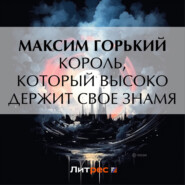По всем вопросам обращайтесь на: info@litportal.ru
(©) 2003-2024.
✖
The Man Who Was Afraid
Настройки чтения
Размер шрифта
Высота строк
Поля
“Why Mikhail?” asked the pilgrim.
“There was in our town the son of a certain merchant Shchurov, he also went off to the Irgiz. And his name was Mikhail.”
Foma spoke and fixedly looked at Father Miron; but the latter was as calm as a deaf-mute —
“I never met such a man. I don’t remember, I never met him,” said he, thoughtfully. “So you wished to inquire about him?”
“Yes.”
“No, I never met Mikhail Shchurov. Well, pardon me for Christ’s sake!” and rising from the lounge, the pilgrim bowed to Foma and went toward the door.
“But wait awhile, sit down, let’s talk a little!” exclaimed Foma, rushing at him uneasily. The pilgrim looked at him searchingly and sank down on the lounge. From the distance came a dull sound, like a deep groan, and immediately after it the signal whistle of the steamer drawled out as in a frightened manner over Foma’s and his guest’s heads. From the distance came a more distant reply, and the whistle overhead again gave out abrupt, timorous sounds. Foma opened the window. Through the fog, not far from their steamer, something was moving along with deep noise; specks of fantastic lights floated by, the fog was agitated and again sank into dead immobility.
“How terrible!” exclaimed Foma, shutting the window.
“What is there to be afraid of?” asked the pilgrim. “You see! It is neither day nor night, neither darkness nor light! We can see nothing, we are sailing we know not whither, we are straying on the river.”
“Have inward fire within you, have light within your soul, and you shall see everything,” said the pilgrim, sternly and instructively.
Foma was displeased with these cold words and looked at the pilgrim askance. The latter sat with drooping head, motionless, as though petrified in thought and prayer. The beads of his rosary were softly rustling in his hands.
The pilgrim’s attitude gave birth to easy courage in Foma’s breast, and he said:
“Tell me, Father Miron, is it good to live, having full freedom, without work, without relatives, a wanderer, like yourself?”
Father Miron raised his head and softly burst into the caressing laughter of a child. All his face, tanned from wind and sunburn, brightened up with inward joy, was radiant with tranquil joy; he touched Foma’s knee with his hand and said in a sincere tone:
“Cast aside from you all that is worldly, for there is no sweetness in it. I am telling you the right word – turn away from evil. Do you remember it is said:
‘Blessed is the man that walketh not in the counsel of the ungodly, nor standeth in the way of sinners.’ Turn away, refresh your soul with solitude and fill yourself with the thought of God. For only by the thought of Him can man save his soul from profanation.”
“That isn’t the thing!” said Foma. “I have no need of working out my salvation. Have I sinned so much? Look at others. What I would like is to comprehend things.”
“And you will comprehend if you turn away from the world. Go forth upon the free road, on the fields, on the steppes, on the plains, on the mountains. Go forth and look at the world from afar, from your freedom.”
“That’s right!” cried Foma. “That’s just what I think. One can see better from the side!”
And Miron, paying no attention to his words, spoke softly, as though of some great mystery, known only to him, the pilgrim:
“The thick slumbering forests around you will start to rustle in sweet voices about the wisdom of the Lord; God’s little birds will sing before you of His holy glory, and the grasses of the steppe will burn incense to the Holy Virgin.”
The pilgrim’s voice now rose and quivered from excess of emotion, now sank to a mysterious whisper. He seemed as though grown younger; his eyes beamed so confidently and clearly, and all his face was radiant with the happy smile of a man who has found expression for his joy and was delighted while he poured it forth.
“The heart of God throbs in each and every blade of grass; each and every insect of the air and of the earth, breathes His holy spirit. God, the Lord, Jesus Christ, lives everywhere! What beauty there is on earth, in the fields and in the forests! Have you ever been on the Kerzhenz? An incomparable silence reigns there supreme, the trees, the grass there are like those of paradise.”
Foma listened, and his imagination, captivated by the quiet, charming narrative, pictured to him those wide fields and dense forests, full of beauty and soul-pacifying silence.
“You look at the sky, as you rest somewhere under a little bush, and the sky seems to descend upon you as though longing to embrace you. Your soul is warm, filled with tranquil joy, you desire nothing, you envy nothing. And it actually seems to you that there is no one on earth save you and God.”
The pilgrim spoke, and his voice and sing-song speech reminded Foma of the wonderful fairy-tales of Aunt Anfisa. He felt as though, after a long journey on a hot day, he drank the clear, cold water of a forest brook, water that had the fragrance of the grasses and the flowers it has bathed. Even wider and wider grew the pictures as they unfolded upon him; here is a path through the thick, slumbering forest; the fine sunbeams penetrate through the branches of the trees, and quiver in the air and under the feet of the wanderer. There is a savoury odour of fungi and decaying foliage; the honeyed fragrance of the flowers, the intense odour of the pine-tree invisibly rise in the air and penetrate the breast in a warm, rich stream. All is silence: only the birds are singing, and the silence is so wonderful that it seems as though even the birds were singing in your breast. You go, without haste, and your life goes on like a dream. While here everything is enveloped in a gray, dead fog, and we are foolishly struggling about in it, yearning for freedom and light. There below they have started to sing something in scarcely audible voices; it was half song, half prayer. Again someone is shouting, scolding. And still they seek the way:
“Seven and a half. Seven!”
“And you have no care,” spoke the pilgrim, and his voice murmured like a brook. “Anybody will give you a crust of bread; and what else do you need in your freedom? In the world, cares fall upon the soul like fetters.”
“You speak well,” said Foma with a sigh.
“My dear brother!” exclaimed the pilgrim, softly, moving still closer toward him. “Since the soul has awakened, since it yearns toward freedom, do not lull it to sleep by force; hearken to its voice. The world with its charms has no beauty and holiness whatever, wherefore, then, obey its laws? In John Chrysostom it is said: ‘The real shechinah is man!’ Shechinah is a Hebrew word and it means the holy of holies. Consequently – ”
A prolonged shrill sound of the whistle drowned his voice. He listened, rose quickly from the lounge and said:
“We are nearing the harbour. That’s what the whistle meant. I must be off! Well, goodbye, brother! May God give you strength and firmness to act according to the will of your soul! Goodbye, my dear boy!”
He made a low bow to Foma. There was something feminine, caressing and soft in his farewell words and bow. Foma also bowed low to him, bowed and remained as though petrified, standing with drooping head, his hand leaning against the table.
“Come to see me when you are in town,” he asked the pilgrim, who was hastily turning the handle of the cabin door.
“I will! I will come! Goodbye! Christ save you!”
When the steamer’s side touched the wharf Foma came out on the deck and began to look downward into the fog. From the steamer people were walking down the gang-planks, but Foma could not discern the pilgrim among those dark figures enveloped in the dense gloom. All those that left the steamer looked equally indistinct, and they all quickly disappeared from sight, as though they had melted in the gray dampness. One could see neither the shore nor anything else solid; the landing bridge rocked from the commotion caused by the steamer; above it the yellow spot of the lantern was swaying; the noise of the footsteps and the bustle of the people were dull.
The steamer put off and slowly moved along into the clouds. The pilgrim, the harbour, the turmoil of people’s voices – all suddenly disappeared like a dream, and again there remained only the dense gloom and the steamer heavily turning about in it. Foma stared before him into the dead sea of fog and thought of the blue, cloudless and caressingly warm sky – where was it?
On the next day, about noon, he sat In Yozhov’s small room and listened to the local news from the mouth of his friend. Yozhov had climbed on the table, which was piled with newspapers, and, swinging his feet, narrated:
“The election campaign has begun. The merchants are putting your godfather up as mayor – that old devil! Like the devil, he is immortal, although he must be upwards of a hundred and fifty years old already. He marries his daughter to Smolin. You remember that red-headed fellow. They say that he is a decent man, but nowadays they even call clever scoundrels decent men, because there are no men. Now Africashka plays the enlightened man; he has already managed to get into intelligent society, donated something to some enterprise or another and thus at once came to the front. Judging from his face, he is a sharper of the highest degree, but he will play a prominent part, for he knows how to adapt himself. Yes, friend, Africashka is a liberal. And a liberal merchant is a mixture of a wolf and a pig with a toad and a snake.”
“The devil take them all!” said Foma, waving his hand indifferently. “What have I to do with them? How about yourself – do you still keep on drinking?”
“I do! Why shouldn’t I drink?”
Half-clad and dishevelled, Yozhov looked like a plucked bird, which had just had a fight and had not yet recovered from the excitement of the conflict.
“I drink because, from time to time, I must quench the fire of my wounded heart. And you, you damp stump, you are smouldering little by little?”
“I have to go to the old man,” said Foma, wrinkling his face.
“Chance it!”
“I don’t feel like going. He’ll start to lecture me.”
“Then don’t go!”
“But I must.”
“Then go!”
“Why do you always play the buffoon?” said Foma, with displeasure, “as though you were indeed merry.”
“There was in our town the son of a certain merchant Shchurov, he also went off to the Irgiz. And his name was Mikhail.”
Foma spoke and fixedly looked at Father Miron; but the latter was as calm as a deaf-mute —
“I never met such a man. I don’t remember, I never met him,” said he, thoughtfully. “So you wished to inquire about him?”
“Yes.”
“No, I never met Mikhail Shchurov. Well, pardon me for Christ’s sake!” and rising from the lounge, the pilgrim bowed to Foma and went toward the door.
“But wait awhile, sit down, let’s talk a little!” exclaimed Foma, rushing at him uneasily. The pilgrim looked at him searchingly and sank down on the lounge. From the distance came a dull sound, like a deep groan, and immediately after it the signal whistle of the steamer drawled out as in a frightened manner over Foma’s and his guest’s heads. From the distance came a more distant reply, and the whistle overhead again gave out abrupt, timorous sounds. Foma opened the window. Through the fog, not far from their steamer, something was moving along with deep noise; specks of fantastic lights floated by, the fog was agitated and again sank into dead immobility.
“How terrible!” exclaimed Foma, shutting the window.
“What is there to be afraid of?” asked the pilgrim. “You see! It is neither day nor night, neither darkness nor light! We can see nothing, we are sailing we know not whither, we are straying on the river.”
“Have inward fire within you, have light within your soul, and you shall see everything,” said the pilgrim, sternly and instructively.
Foma was displeased with these cold words and looked at the pilgrim askance. The latter sat with drooping head, motionless, as though petrified in thought and prayer. The beads of his rosary were softly rustling in his hands.
The pilgrim’s attitude gave birth to easy courage in Foma’s breast, and he said:
“Tell me, Father Miron, is it good to live, having full freedom, without work, without relatives, a wanderer, like yourself?”
Father Miron raised his head and softly burst into the caressing laughter of a child. All his face, tanned from wind and sunburn, brightened up with inward joy, was radiant with tranquil joy; he touched Foma’s knee with his hand and said in a sincere tone:
“Cast aside from you all that is worldly, for there is no sweetness in it. I am telling you the right word – turn away from evil. Do you remember it is said:
‘Blessed is the man that walketh not in the counsel of the ungodly, nor standeth in the way of sinners.’ Turn away, refresh your soul with solitude and fill yourself with the thought of God. For only by the thought of Him can man save his soul from profanation.”
“That isn’t the thing!” said Foma. “I have no need of working out my salvation. Have I sinned so much? Look at others. What I would like is to comprehend things.”
“And you will comprehend if you turn away from the world. Go forth upon the free road, on the fields, on the steppes, on the plains, on the mountains. Go forth and look at the world from afar, from your freedom.”
“That’s right!” cried Foma. “That’s just what I think. One can see better from the side!”
And Miron, paying no attention to his words, spoke softly, as though of some great mystery, known only to him, the pilgrim:
“The thick slumbering forests around you will start to rustle in sweet voices about the wisdom of the Lord; God’s little birds will sing before you of His holy glory, and the grasses of the steppe will burn incense to the Holy Virgin.”
The pilgrim’s voice now rose and quivered from excess of emotion, now sank to a mysterious whisper. He seemed as though grown younger; his eyes beamed so confidently and clearly, and all his face was radiant with the happy smile of a man who has found expression for his joy and was delighted while he poured it forth.
“The heart of God throbs in each and every blade of grass; each and every insect of the air and of the earth, breathes His holy spirit. God, the Lord, Jesus Christ, lives everywhere! What beauty there is on earth, in the fields and in the forests! Have you ever been on the Kerzhenz? An incomparable silence reigns there supreme, the trees, the grass there are like those of paradise.”
Foma listened, and his imagination, captivated by the quiet, charming narrative, pictured to him those wide fields and dense forests, full of beauty and soul-pacifying silence.
“You look at the sky, as you rest somewhere under a little bush, and the sky seems to descend upon you as though longing to embrace you. Your soul is warm, filled with tranquil joy, you desire nothing, you envy nothing. And it actually seems to you that there is no one on earth save you and God.”
The pilgrim spoke, and his voice and sing-song speech reminded Foma of the wonderful fairy-tales of Aunt Anfisa. He felt as though, after a long journey on a hot day, he drank the clear, cold water of a forest brook, water that had the fragrance of the grasses and the flowers it has bathed. Even wider and wider grew the pictures as they unfolded upon him; here is a path through the thick, slumbering forest; the fine sunbeams penetrate through the branches of the trees, and quiver in the air and under the feet of the wanderer. There is a savoury odour of fungi and decaying foliage; the honeyed fragrance of the flowers, the intense odour of the pine-tree invisibly rise in the air and penetrate the breast in a warm, rich stream. All is silence: only the birds are singing, and the silence is so wonderful that it seems as though even the birds were singing in your breast. You go, without haste, and your life goes on like a dream. While here everything is enveloped in a gray, dead fog, and we are foolishly struggling about in it, yearning for freedom and light. There below they have started to sing something in scarcely audible voices; it was half song, half prayer. Again someone is shouting, scolding. And still they seek the way:
“Seven and a half. Seven!”
“And you have no care,” spoke the pilgrim, and his voice murmured like a brook. “Anybody will give you a crust of bread; and what else do you need in your freedom? In the world, cares fall upon the soul like fetters.”
“You speak well,” said Foma with a sigh.
“My dear brother!” exclaimed the pilgrim, softly, moving still closer toward him. “Since the soul has awakened, since it yearns toward freedom, do not lull it to sleep by force; hearken to its voice. The world with its charms has no beauty and holiness whatever, wherefore, then, obey its laws? In John Chrysostom it is said: ‘The real shechinah is man!’ Shechinah is a Hebrew word and it means the holy of holies. Consequently – ”
A prolonged shrill sound of the whistle drowned his voice. He listened, rose quickly from the lounge and said:
“We are nearing the harbour. That’s what the whistle meant. I must be off! Well, goodbye, brother! May God give you strength and firmness to act according to the will of your soul! Goodbye, my dear boy!”
He made a low bow to Foma. There was something feminine, caressing and soft in his farewell words and bow. Foma also bowed low to him, bowed and remained as though petrified, standing with drooping head, his hand leaning against the table.
“Come to see me when you are in town,” he asked the pilgrim, who was hastily turning the handle of the cabin door.
“I will! I will come! Goodbye! Christ save you!”
When the steamer’s side touched the wharf Foma came out on the deck and began to look downward into the fog. From the steamer people were walking down the gang-planks, but Foma could not discern the pilgrim among those dark figures enveloped in the dense gloom. All those that left the steamer looked equally indistinct, and they all quickly disappeared from sight, as though they had melted in the gray dampness. One could see neither the shore nor anything else solid; the landing bridge rocked from the commotion caused by the steamer; above it the yellow spot of the lantern was swaying; the noise of the footsteps and the bustle of the people were dull.
The steamer put off and slowly moved along into the clouds. The pilgrim, the harbour, the turmoil of people’s voices – all suddenly disappeared like a dream, and again there remained only the dense gloom and the steamer heavily turning about in it. Foma stared before him into the dead sea of fog and thought of the blue, cloudless and caressingly warm sky – where was it?
On the next day, about noon, he sat In Yozhov’s small room and listened to the local news from the mouth of his friend. Yozhov had climbed on the table, which was piled with newspapers, and, swinging his feet, narrated:
“The election campaign has begun. The merchants are putting your godfather up as mayor – that old devil! Like the devil, he is immortal, although he must be upwards of a hundred and fifty years old already. He marries his daughter to Smolin. You remember that red-headed fellow. They say that he is a decent man, but nowadays they even call clever scoundrels decent men, because there are no men. Now Africashka plays the enlightened man; he has already managed to get into intelligent society, donated something to some enterprise or another and thus at once came to the front. Judging from his face, he is a sharper of the highest degree, but he will play a prominent part, for he knows how to adapt himself. Yes, friend, Africashka is a liberal. And a liberal merchant is a mixture of a wolf and a pig with a toad and a snake.”
“The devil take them all!” said Foma, waving his hand indifferently. “What have I to do with them? How about yourself – do you still keep on drinking?”
“I do! Why shouldn’t I drink?”
Half-clad and dishevelled, Yozhov looked like a plucked bird, which had just had a fight and had not yet recovered from the excitement of the conflict.
“I drink because, from time to time, I must quench the fire of my wounded heart. And you, you damp stump, you are smouldering little by little?”
“I have to go to the old man,” said Foma, wrinkling his face.
“Chance it!”
“I don’t feel like going. He’ll start to lecture me.”
“Then don’t go!”
“But I must.”
“Then go!”
“Why do you always play the buffoon?” said Foma, with displeasure, “as though you were indeed merry.”

















